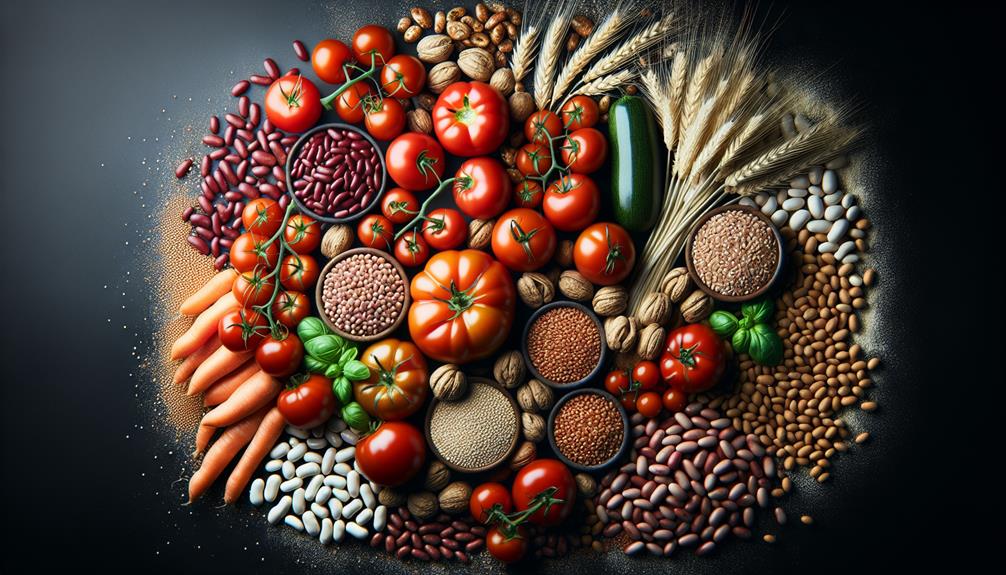Imagine navigating through a forest of dietary advice, where the Plant Paradox Diet stands out like a lighthouse in the fog. Balancing health and lectins may seem like a daunting task, but understanding the impact of these plant proteins on your well-being is crucial. As you delve into the intricacies of this controversial diet, you'll uncover a world where plant lectins can either harm or heal, leaving you intrigued about the potential benefits and criticisms surrounding this unique approach.
Key Takeaways
- Lectins in plant foods can impact health.
- The diet focuses on nutrient-dense, low-lectin foods.
- Proper preparation reduces lectin content.
- Balance and moderation are crucial on the Plant Paradox diet.
Understanding Lectins and Health
Understanding how lectins impact health is crucial for making informed dietary choices that support overall well-being. Lectins are proteins that can be found in many plant foods. While they have been deemed potentially harmful due to their ability to bind to cells and potentially cause inflammation, it's essential to note that not all lectins are created equal. Some can indeed contribute to inflammation, which is linked to various health issues, including autoimmune conditions. Moreover, lectins have been associated with weight regulation. They can interfere with the body's satiety signals, potentially leading to overeating and weight gain.
When considering lectins and inflammation, it's important to understand that certain individuals may be more sensitive to lectins than others. This sensitivity can manifest as digestive issues, joint pain, or skin problems. By being mindful of your lectin intake and opting for preparation methods like soaking, fermenting, or cooking, you can help reduce the potential negative effects of lectins on your health. Remember, moderation and balance are key when it comes to incorporating lectin-containing foods into your diet.
Key Principles of the Plant Paradox
The Plant Paradox diet emphasizes the importance of incorporating a variety of nutrient-dense foods while minimizing lectin-rich options for optimal health benefits. The Plant Paradox principles revolve around lectin balancing, which involves choosing foods that are low in lectins while still providing essential nutrients. By focusing on whole, unprocessed foods such as leafy greens, cruciferous vegetables, healthy fats, and quality proteins, you can support your overall health and well-being.
Key principles of the Plant Paradox include prioritizing organic produce to reduce exposure to pesticides and other harmful chemicals that can disrupt gut health. It also encourages the consumption of foods rich in polyphenols, which are powerful antioxidants that help combat inflammation and oxidative stress in the body. Additionally, the diet emphasizes the importance of proper food preparation methods like soaking, fermenting, and cooking certain foods to reduce lectin content and improve digestibility. By following these principles, you can create a balanced and nourishing diet that supports your health goals while minimizing the potential negative effects of lectins.
High-Lectin Foods to Avoid

To optimize your health on the Plant Paradox diet, it is crucial to steer clear of high-lectin foods that can potentially disrupt your well-being and gut health. Lectins are a type of protein that can be found in various plant foods. These proteins can have a negative impact on your health by binding to the lining of your gut, potentially leading to inflammation and other digestive issues. By avoiding high-lectin foods, you can reduce the lectin impact on your body and promote better overall health.
Some common high-lectin foods to avoid include legumes such as beans, lentils, and peanuts, as well as nightshade vegetables like tomatoes, eggplants, and peppers. Grains like wheat, barley, and oats also contain high levels of lectins and should be eliminated or minimized in your diet. By practicing lectin avoidance and opting for low-lectin alternatives, you can support your gut health and well-being on the Plant Paradox diet.
Low-Lectin Foods to Enjoy
Opt for incorporating nutrient-rich vegetables, such as leafy greens, broccoli, and cauliflower, into your diet to enjoy low-lectin foods while supporting your overall health on the Plant Paradox diet. These foods are not only delicious but also provide essential nutrients without the lectin content that can cause issues in individuals with lectin sensitivity.
- Spinach: Packed with vitamins, minerals, and antioxidants, spinach is a versatile leafy green that can be enjoyed raw in salads or cooked in various dishes.
- Zucchini: This low-lectin vegetable is a great source of fiber and can be spiralized into noodles or added to stir-fries for a nutritious boost.
- Blueberries: Rich in antioxidants and phytochemicals, blueberries make a tasty and lectin-free addition to your diet, whether eaten on their own, added to smoothies, or used in lectin-free recipes.
Potential Benefits and Criticisms

Considering both the potential benefits and criticisms of the Plant Paradox diet can help you make informed decisions about whether it aligns with your health goals and lifestyle. The diet's emphasis on whole, unprocessed foods rich in nutrients like vitamins, minerals, and antioxidants can be a significant benefit. By promoting the consumption of healthy fats, lean proteins, and a variety of vegetables, the diet may support weight management, heart health, and overall well-being.
However, some criticisms of the Plant Paradox diet revolve around its restrictive nature. Eliminating lectin-containing foods may lead to a reduction in the variety of foods consumed, potentially causing nutrient deficiencies if not carefully planned. Moreover, some experts argue that the scientific evidence linking lectins to health issues in humans is limited and that the diet's restrictions may not be necessary for everyone.
When considering the Plant Paradox diet, it is essential to weigh these potential benefits against the drawbacks to determine if it is a suitable choice for you. Consulting with a healthcare provider or a nutritionist can provide personalized guidance based on your specific health needs and goals.
Frequently Asked Questions
Can the Plant Paradox Diet Help With Specific Health Conditions Like Autoimmune Diseases or Digestive Issues?
Yes, the Plant Paradox Diet can potentially help with autoimmune conditions due to its focus on reducing lectins, which may trigger immune responses. It also aims to improve digestive issues by addressing lectin sensitivity, promoting gut health.
Are There Any Potential Side Effects or Risks Associated With Following the Plant Paradox Diet Long-Term?
Wondering about the long-term effects of following the Plant Paradox Diet? While it offers benefits like weight loss and improved gut health, potential risks include nutrient deficiencies and restrictions that may not be sustainable.
How Does the Plant Paradox Diet Compare to Other Popular Diets Like the Mediterranean Diet or Paleo Diet?
When comparing the Plant Paradox diet to Mediterranean or Paleo diets, consider nutritional benefits and weight loss potential. Evaluate sustainability and long-term results for the best fit. Make informed choices based on what aligns with your health goals.
Are There Any Specific Guidelines for Portion Sizes or Meal Frequency on the Plant Paradox Diet?
Focus on portion control by eating balanced meals. Listen to your body for satiety cues, which can guide meal timing. Opt for nutrient-dense foods to support energy levels. Stay mindful of portion sizes and meal frequencies for optimal health.
Can Children or Pregnant Women Safely Follow the Plant Paradox Diet?
When it comes to childhood nutrition and a pregnancy diet, it's crucial to prioritize a balanced intake of essential nutrients. Consult with healthcare providers to ensure that any dietary changes align with the specific needs of children or pregnant women.
Conclusion
In conclusion, navigating the plant paradox diet is like walking a tightrope between health and lectins. By balancing high-lectin foods to avoid with low-lectin foods to enjoy, you can potentially reap the benefits of improved gut health and overall well-being. Remember, just as a skilled tightrope walker maintains their balance, you too can find harmony in your diet by being mindful of the impact lectins can have on your health.













